Ethical Dilemma Analysis: Application of ACS Codes and Methodologies
VerifiedAdded on 2023/03/30
|6
|962
|137
Report
AI Summary
This report examines an ethical dilemma faced by Llnaz, who is uncomfortable working with a male colleague due to cultural and religious beliefs. The assignment utilizes Thomas White's methodology to analyze the consequences of different actions, including discussing the issue with the manager, the colleague, or her husband. It applies relevant clauses from the ACS code of ethics, emphasizing public interest, professional development, and professionalism, and the ACS code of professional conduct, focusing on distinguishing personal and professional opinions, maintaining professional image, promoting workplace diversity, and increasing awareness of professional issues. The report explores how these codes and methodologies can help Llnaz make an informed and ethical decision.
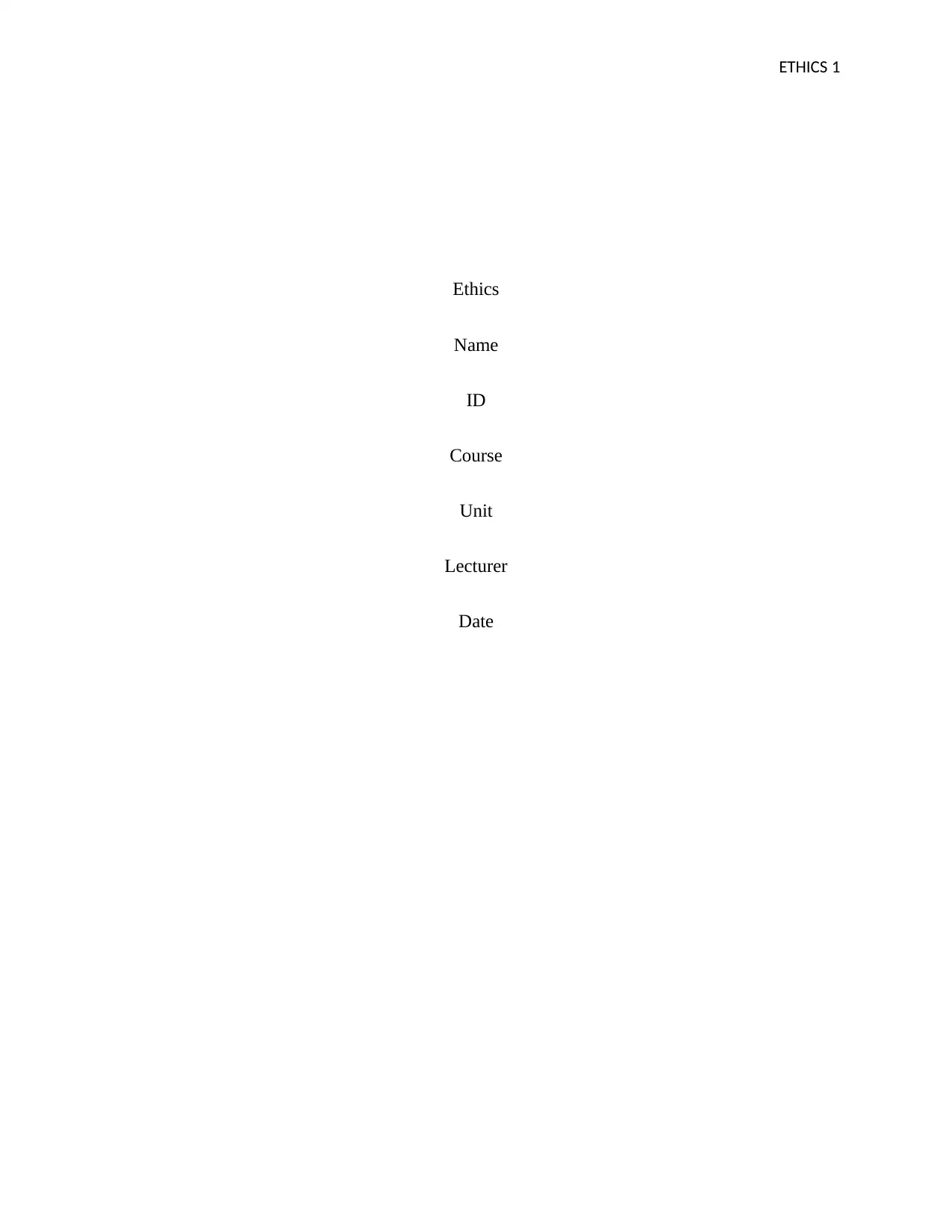
ETHICS 1
Ethics
Name
ID
Course
Unit
Lecturer
Date
Ethics
Name
ID
Course
Unit
Lecturer
Date
Paraphrase This Document
Need a fresh take? Get an instant paraphrase of this document with our AI Paraphraser
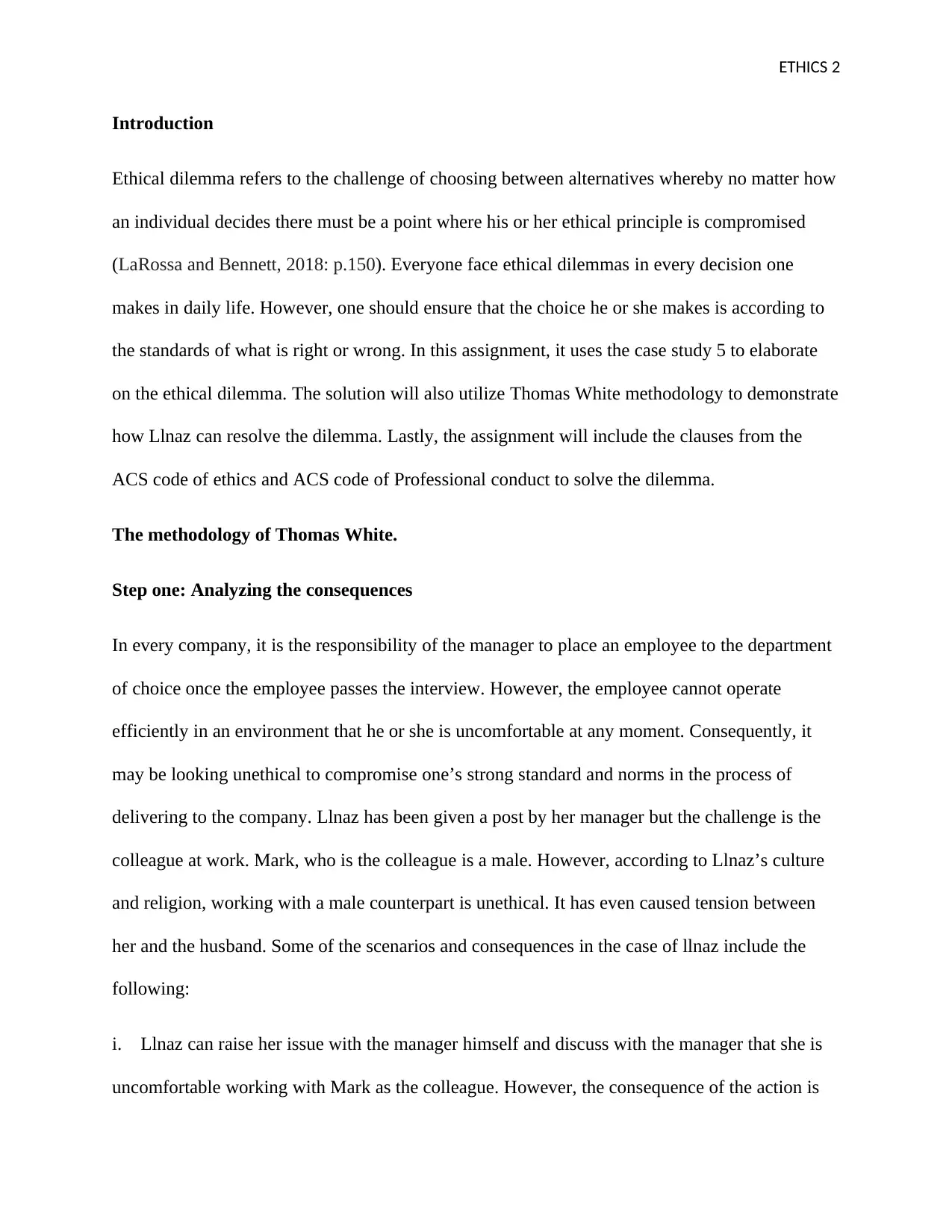
ETHICS 2
Introduction
Ethical dilemma refers to the challenge of choosing between alternatives whereby no matter how
an individual decides there must be a point where his or her ethical principle is compromised
(LaRossa and Bennett, 2018: p.150). Everyone face ethical dilemmas in every decision one
makes in daily life. However, one should ensure that the choice he or she makes is according to
the standards of what is right or wrong. In this assignment, it uses the case study 5 to elaborate
on the ethical dilemma. The solution will also utilize Thomas White methodology to demonstrate
how Llnaz can resolve the dilemma. Lastly, the assignment will include the clauses from the
ACS code of ethics and ACS code of Professional conduct to solve the dilemma.
The methodology of Thomas White.
Step one: Analyzing the consequences
In every company, it is the responsibility of the manager to place an employee to the department
of choice once the employee passes the interview. However, the employee cannot operate
efficiently in an environment that he or she is uncomfortable at any moment. Consequently, it
may be looking unethical to compromise one’s strong standard and norms in the process of
delivering to the company. Llnaz has been given a post by her manager but the challenge is the
colleague at work. Mark, who is the colleague is a male. However, according to Llnaz’s culture
and religion, working with a male counterpart is unethical. It has even caused tension between
her and the husband. Some of the scenarios and consequences in the case of llnaz include the
following:
i. Llnaz can raise her issue with the manager himself and discuss with the manager that she is
uncomfortable working with Mark as the colleague. However, the consequence of the action is
Introduction
Ethical dilemma refers to the challenge of choosing between alternatives whereby no matter how
an individual decides there must be a point where his or her ethical principle is compromised
(LaRossa and Bennett, 2018: p.150). Everyone face ethical dilemmas in every decision one
makes in daily life. However, one should ensure that the choice he or she makes is according to
the standards of what is right or wrong. In this assignment, it uses the case study 5 to elaborate
on the ethical dilemma. The solution will also utilize Thomas White methodology to demonstrate
how Llnaz can resolve the dilemma. Lastly, the assignment will include the clauses from the
ACS code of ethics and ACS code of Professional conduct to solve the dilemma.
The methodology of Thomas White.
Step one: Analyzing the consequences
In every company, it is the responsibility of the manager to place an employee to the department
of choice once the employee passes the interview. However, the employee cannot operate
efficiently in an environment that he or she is uncomfortable at any moment. Consequently, it
may be looking unethical to compromise one’s strong standard and norms in the process of
delivering to the company. Llnaz has been given a post by her manager but the challenge is the
colleague at work. Mark, who is the colleague is a male. However, according to Llnaz’s culture
and religion, working with a male counterpart is unethical. It has even caused tension between
her and the husband. Some of the scenarios and consequences in the case of llnaz include the
following:
i. Llnaz can raise her issue with the manager himself and discuss with the manager that she is
uncomfortable working with Mark as the colleague. However, the consequence of the action is
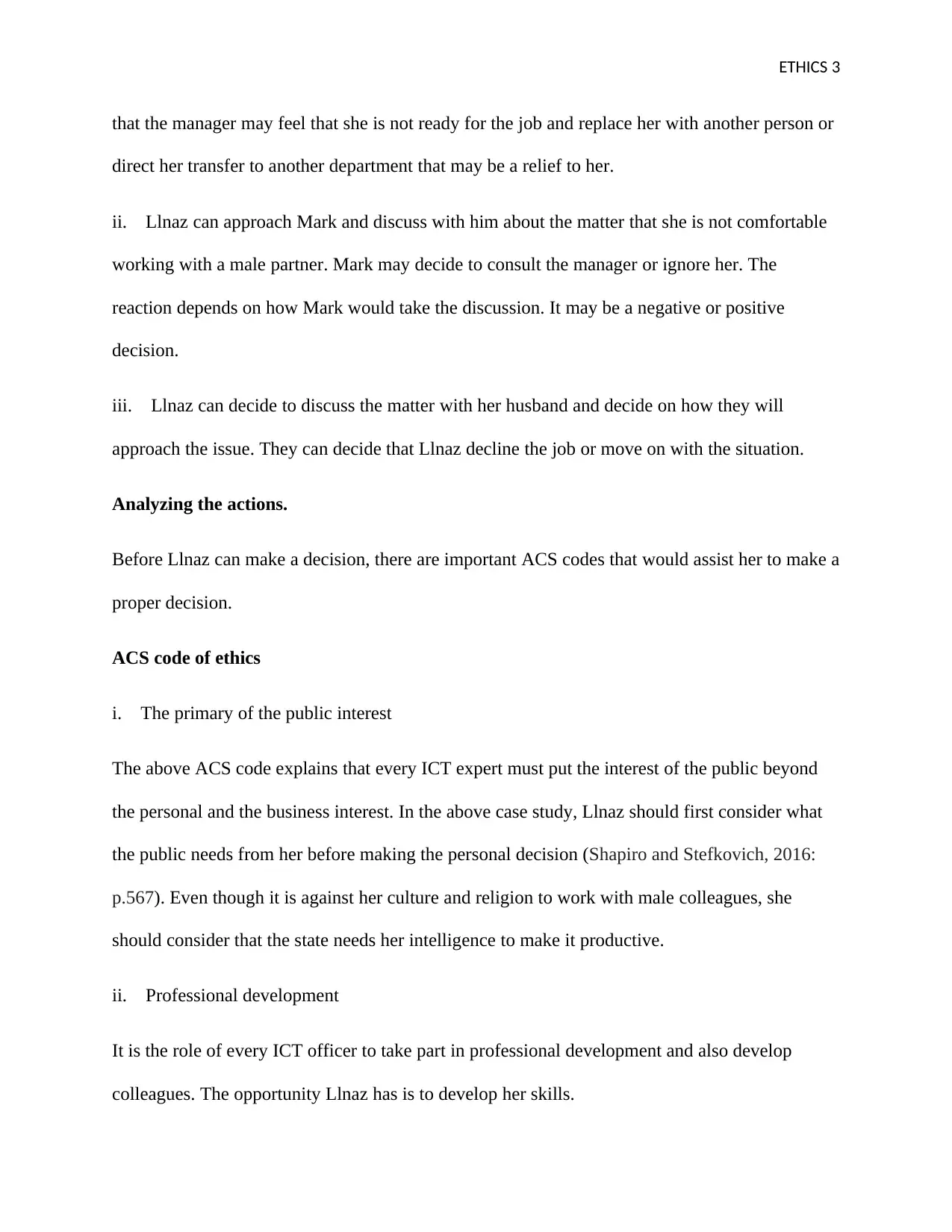
ETHICS 3
that the manager may feel that she is not ready for the job and replace her with another person or
direct her transfer to another department that may be a relief to her.
ii. Llnaz can approach Mark and discuss with him about the matter that she is not comfortable
working with a male partner. Mark may decide to consult the manager or ignore her. The
reaction depends on how Mark would take the discussion. It may be a negative or positive
decision.
iii. Llnaz can decide to discuss the matter with her husband and decide on how they will
approach the issue. They can decide that Llnaz decline the job or move on with the situation.
Analyzing the actions.
Before Llnaz can make a decision, there are important ACS codes that would assist her to make a
proper decision.
ACS code of ethics
i. The primary of the public interest
The above ACS code explains that every ICT expert must put the interest of the public beyond
the personal and the business interest. In the above case study, Llnaz should first consider what
the public needs from her before making the personal decision (Shapiro and Stefkovich, 2016:
p.567). Even though it is against her culture and religion to work with male colleagues, she
should consider that the state needs her intelligence to make it productive.
ii. Professional development
It is the role of every ICT officer to take part in professional development and also develop
colleagues. The opportunity Llnaz has is to develop her skills.
that the manager may feel that she is not ready for the job and replace her with another person or
direct her transfer to another department that may be a relief to her.
ii. Llnaz can approach Mark and discuss with him about the matter that she is not comfortable
working with a male partner. Mark may decide to consult the manager or ignore her. The
reaction depends on how Mark would take the discussion. It may be a negative or positive
decision.
iii. Llnaz can decide to discuss the matter with her husband and decide on how they will
approach the issue. They can decide that Llnaz decline the job or move on with the situation.
Analyzing the actions.
Before Llnaz can make a decision, there are important ACS codes that would assist her to make a
proper decision.
ACS code of ethics
i. The primary of the public interest
The above ACS code explains that every ICT expert must put the interest of the public beyond
the personal and the business interest. In the above case study, Llnaz should first consider what
the public needs from her before making the personal decision (Shapiro and Stefkovich, 2016:
p.567). Even though it is against her culture and religion to work with male colleagues, she
should consider that the state needs her intelligence to make it productive.
ii. Professional development
It is the role of every ICT officer to take part in professional development and also develop
colleagues. The opportunity Llnaz has is to develop her skills.
⊘ This is a preview!⊘
Do you want full access?
Subscribe today to unlock all pages.

Trusted by 1+ million students worldwide
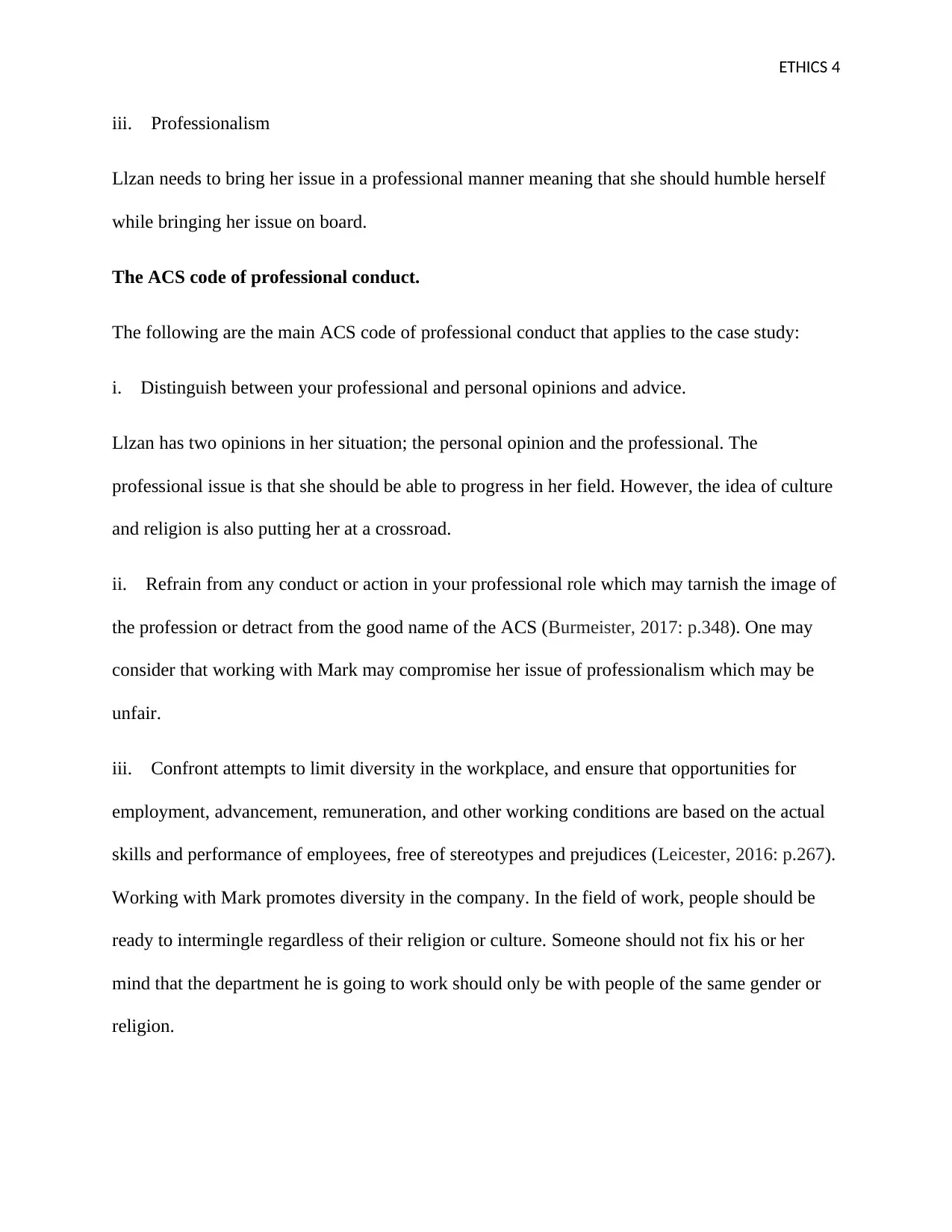
ETHICS 4
iii. Professionalism
Llzan needs to bring her issue in a professional manner meaning that she should humble herself
while bringing her issue on board.
The ACS code of professional conduct.
The following are the main ACS code of professional conduct that applies to the case study:
i. Distinguish between your professional and personal opinions and advice.
Llzan has two opinions in her situation; the personal opinion and the professional. The
professional issue is that she should be able to progress in her field. However, the idea of culture
and religion is also putting her at a crossroad.
ii. Refrain from any conduct or action in your professional role which may tarnish the image of
the profession or detract from the good name of the ACS (Burmeister, 2017: p.348). One may
consider that working with Mark may compromise her issue of professionalism which may be
unfair.
iii. Confront attempts to limit diversity in the workplace, and ensure that opportunities for
employment, advancement, remuneration, and other working conditions are based on the actual
skills and performance of employees, free of stereotypes and prejudices (Leicester, 2016: p.267).
Working with Mark promotes diversity in the company. In the field of work, people should be
ready to intermingle regardless of their religion or culture. Someone should not fix his or her
mind that the department he is going to work should only be with people of the same gender or
religion.
iii. Professionalism
Llzan needs to bring her issue in a professional manner meaning that she should humble herself
while bringing her issue on board.
The ACS code of professional conduct.
The following are the main ACS code of professional conduct that applies to the case study:
i. Distinguish between your professional and personal opinions and advice.
Llzan has two opinions in her situation; the personal opinion and the professional. The
professional issue is that she should be able to progress in her field. However, the idea of culture
and religion is also putting her at a crossroad.
ii. Refrain from any conduct or action in your professional role which may tarnish the image of
the profession or detract from the good name of the ACS (Burmeister, 2017: p.348). One may
consider that working with Mark may compromise her issue of professionalism which may be
unfair.
iii. Confront attempts to limit diversity in the workplace, and ensure that opportunities for
employment, advancement, remuneration, and other working conditions are based on the actual
skills and performance of employees, free of stereotypes and prejudices (Leicester, 2016: p.267).
Working with Mark promotes diversity in the company. In the field of work, people should be
ready to intermingle regardless of their religion or culture. Someone should not fix his or her
mind that the department he is going to work should only be with people of the same gender or
religion.
Paraphrase This Document
Need a fresh take? Get an instant paraphrase of this document with our AI Paraphraser
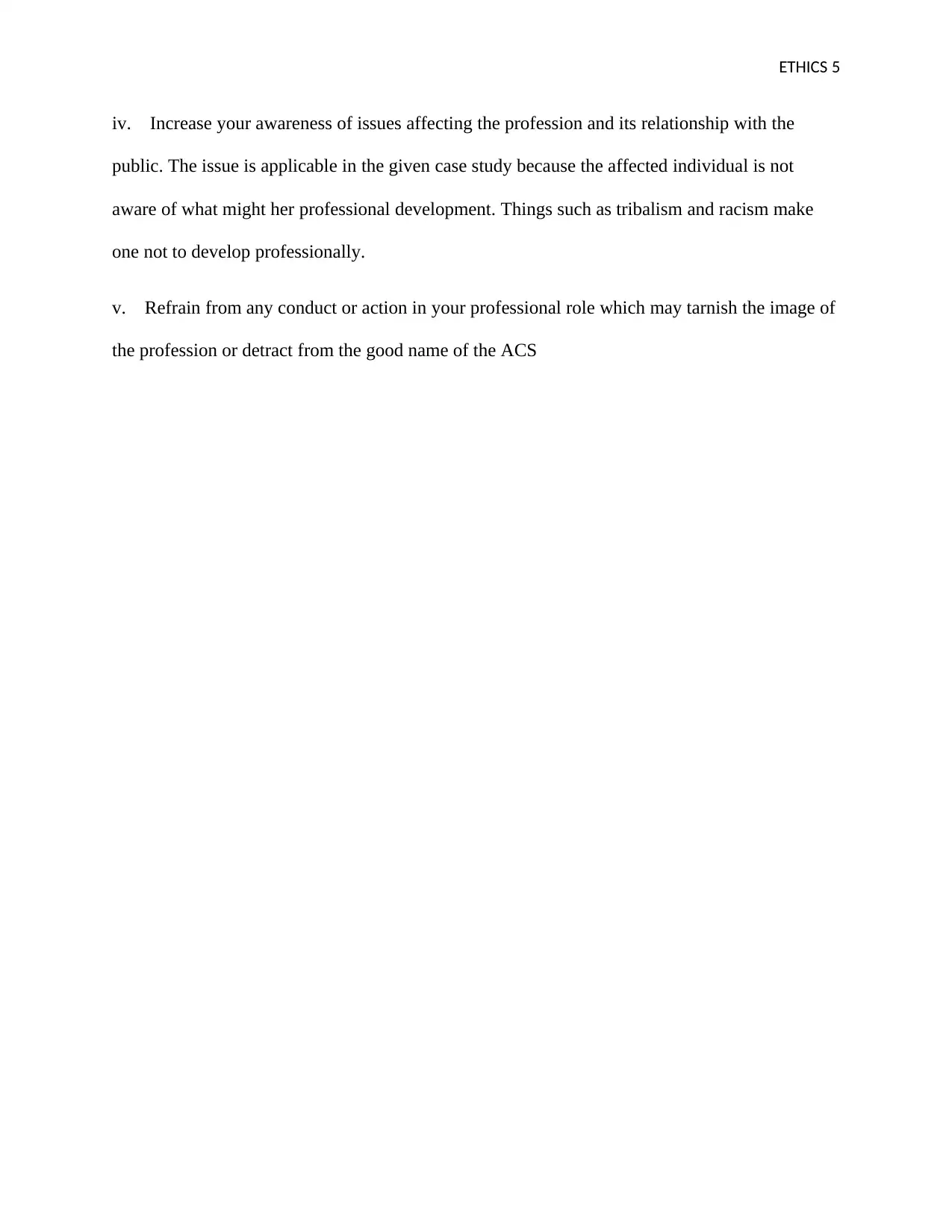
ETHICS 5
iv. Increase your awareness of issues affecting the profession and its relationship with the
public. The issue is applicable in the given case study because the affected individual is not
aware of what might her professional development. Things such as tribalism and racism make
one not to develop professionally.
v. Refrain from any conduct or action in your professional role which may tarnish the image of
the profession or detract from the good name of the ACS
iv. Increase your awareness of issues affecting the profession and its relationship with the
public. The issue is applicable in the given case study because the affected individual is not
aware of what might her professional development. Things such as tribalism and racism make
one not to develop professionally.
v. Refrain from any conduct or action in your professional role which may tarnish the image of
the profession or detract from the good name of the ACS
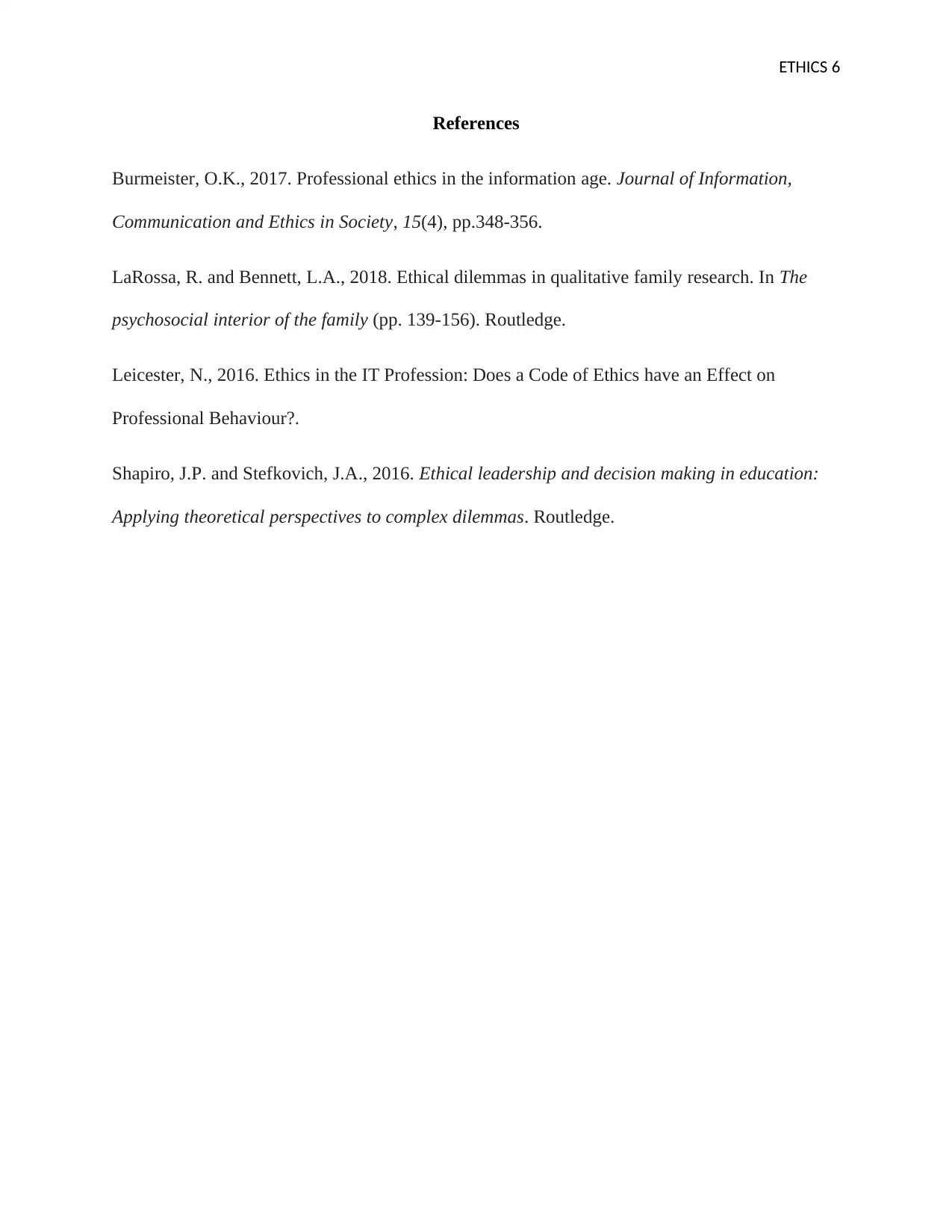
ETHICS 6
References
Burmeister, O.K., 2017. Professional ethics in the information age. Journal of Information,
Communication and Ethics in Society, 15(4), pp.348-356.
LaRossa, R. and Bennett, L.A., 2018. Ethical dilemmas in qualitative family research. In The
psychosocial interior of the family (pp. 139-156). Routledge.
Leicester, N., 2016. Ethics in the IT Profession: Does a Code of Ethics have an Effect on
Professional Behaviour?.
Shapiro, J.P. and Stefkovich, J.A., 2016. Ethical leadership and decision making in education:
Applying theoretical perspectives to complex dilemmas. Routledge.
References
Burmeister, O.K., 2017. Professional ethics in the information age. Journal of Information,
Communication and Ethics in Society, 15(4), pp.348-356.
LaRossa, R. and Bennett, L.A., 2018. Ethical dilemmas in qualitative family research. In The
psychosocial interior of the family (pp. 139-156). Routledge.
Leicester, N., 2016. Ethics in the IT Profession: Does a Code of Ethics have an Effect on
Professional Behaviour?.
Shapiro, J.P. and Stefkovich, J.A., 2016. Ethical leadership and decision making in education:
Applying theoretical perspectives to complex dilemmas. Routledge.
⊘ This is a preview!⊘
Do you want full access?
Subscribe today to unlock all pages.

Trusted by 1+ million students worldwide
1 out of 6
Related Documents
Your All-in-One AI-Powered Toolkit for Academic Success.
+13062052269
info@desklib.com
Available 24*7 on WhatsApp / Email
![[object Object]](/_next/static/media/star-bottom.7253800d.svg)
Unlock your academic potential
Copyright © 2020–2025 A2Z Services. All Rights Reserved. Developed and managed by ZUCOL.



